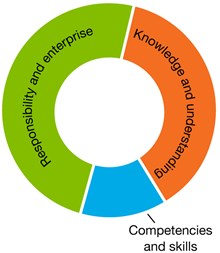Explore content
The Ethical Understanding capability has a role in developing consumer and financial literacy in young people. This capability equips students to take account of ethical considerations in consumer and financial contexts such as human rights and environmental issues related to the production and consumption of goods and services. Ethical Understanding contributes to the development of the dimensions of consumer and financial literacy as shown in the diagram below.

Approximate proportion of the dimensions addressed by Ethical Understanding
Ethical Understanding assists students to navigate the consumer and financial world of competing values, rights, interests and norms. Students build a strong personal and socially-oriented ethical outlook that helps them to manage consumer and financial contexts and to develop an awareness of the influence that their values and behaviours have on others, including the impact of their consumer and financial choices. The Ethical Understanding capability does this through fostering the development of personal values and attributes such as honesty, resilience, empathy and respect for others, and the capacity to act with ethical integrity. Students learn to recognise ethical concepts and explore ethical issues in consumer and financial contexts such as sustainable living and socio-economic disparity. They also learn to consider the outcomes of and reflect on ethical action. This element involves students identifying and examining values and exploring rights and responsibilities of individuals and groups in consumer and financial contexts and practices.
Moneysmart for teachers and Tax, Super and You provide a number of interdisciplinary units and interactive activities that include aspects of the Ethical Understanding capability.
Typically, by the end of Year 6, students:
Recognise ethical concepts
examine and explain ethical concepts such as truth and justice that contribute to the achievement of a particular outcome
Explore ethical concepts in context
explain what constitutes an ethically better or worse outcome and how it might be accomplished
Reason and make ethical decisions
explore the reasons behind there being a variety of ethical positions on a social issue
Typically, by the end of Year 6, students:
Reflect on ethical action
articulate a range of ethical responses to situations in various social contexts
Typically, by the end of Year 6, students:
Consider consequences
evaluate the consequences of actions in familiar and hypothetical scenarios
Examine values
examine values accepted and enacted within various communities
Explore rights and responsibilities
monitor consistency between rights and responsibilities when interacting face-to-face or through social media
Consider points of view
explain a range of possible interpretations and points of view when thinking about ethical dilemmas

